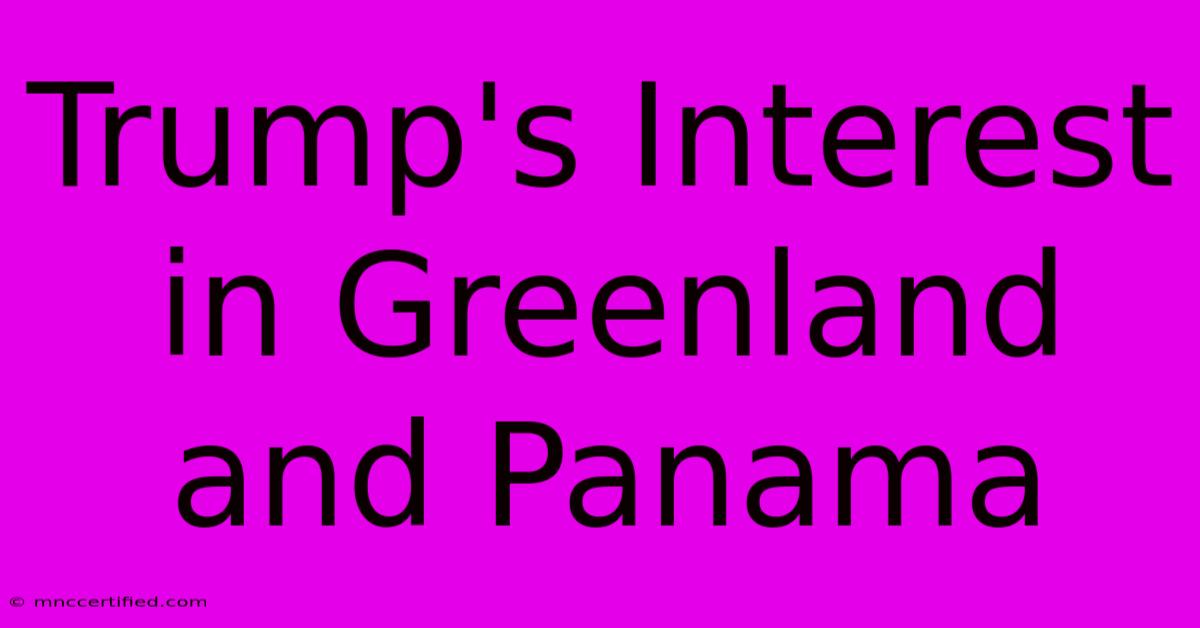Trump's Interest In Greenland And Panama

Table of Contents
Trump's Greenland and Panama Pursuits: Land Deals, Geopolitics, and Controversy
Donald Trump's presidency was marked by several unconventional foreign policy initiatives, and his expressed interest in purchasing Greenland and his business dealings in Panama stand out as particularly intriguing examples. These seemingly disparate situations reveal a pattern of real estate-focused thinking applied to international relations, sparking considerable debate and controversy.
Greenland: A Real Estate Deal Gone Wrong?
In August 2019, news broke that President Trump had expressed interest in the United States purchasing Greenland from Denmark. This proposal, met with widespread bewilderment and outright rejection from the Danish government, became a global talking point. While the official reason given for the interest varied, it stemmed from a perceived strategic advantage for the U.S., particularly concerning resource extraction and military positioning.
The Strategic Angle (and its Shortcomings)
The potential acquisition of Greenland was presented by some as a way to counter growing Chinese influence in the Arctic region. Greenland possesses significant mineral resources, and its strategic location provides access to vital shipping lanes. However, the lack of any concrete plan for acquisition, coupled with the blatant disregard for Danish sovereignty, rendered the idea largely symbolic. Critics pointed to the immense financial costs, the potential for environmental damage, and the violation of international norms. The plan ultimately failed, highlighting the limitations of a purely transactional approach to international diplomacy.
The Public Perception and Fallout
The Greenland proposal caused significant damage to U.S.-Danish relations. It was widely perceived as disrespectful and ill-conceived, further fueling existing criticisms of Trump's foreign policy approach. The episode underscored the importance of diplomatic sensitivity and consultation in international dealings, highlighting the significant gap between the Trump administration’s approach and traditional diplomatic norms. This episode served as a case study in how a seemingly innocuous interest, driven by perceived real estate value, could unravel into a major diplomatic blunder.
Panama: Business, Controversy, and the Shadow of the Past
Trump's business dealings in Panama have a long history, stretching back decades before his presidency. His involvement in Panama City's real estate market, particularly his association with the Trump Ocean Club International Hotel & Tower, reflects a consistent pattern in his business career: a focus on luxury development and brand recognition.
The Trump Ocean Club: Success and Scandal
The Trump Ocean Club, despite its initial success, became embroiled in various controversies. These included lawsuits regarding construction issues, financial disputes with partners, and ongoing legal battles related to the building’s management and ownership. These issues reflect some of the broader challenges of Trump's business practices, often characterized by a degree of legal ambiguity and aggressive business tactics.
The Geopolitical Context: Panama's Strategic Importance
Panama's strategic location, commanding the Panama Canal, makes it a significant player in global trade and geopolitics. Trump's business involvement in the country, though seemingly distinct from his broader foreign policy agenda, isn't entirely separate. The underlying themes of access to resources and strategic locations, present in the Greenland proposal, subtly reappear in his Panamanian business interests.
Conclusion: A Pattern of Transactional Internationalism?
Both Trump's Greenland ambition and his Panamanian business dealings showcase a transactional approach to international relations, prioritizing perceived economic or strategic value over diplomatic nuance and long-term relationships. While the Greenland proposal failed spectacularly, the Panama situation highlights the long-term implications of this approach. His actions raise fundamental questions about the nature of diplomacy in the 21st century, and how considerations of personal gain and real estate value might intersect with a country's foreign policy objectives. Analyzing these cases offers valuable insights into the complexities of international relations and the impact of leadership styles on diplomatic outcomes. It serves as a cautionary tale about the potential pitfalls of prioritizing short-term gains over long-term strategic alliances and international cooperation.

Thank you for visiting our website wich cover about Trump's Interest In Greenland And Panama. We hope the information provided has been useful to you. Feel free to contact us if you have any questions or need further assistance. See you next time and dont miss to bookmark.
Featured Posts
-
Santa Tracker In Northeast Louisiana
Dec 24, 2024
-
Nissan Honda Facing Industry Change
Dec 24, 2024
-
Santa Tracker From Cold War To Today
Dec 24, 2024
-
Knicks Barrett Anunoby Trade Fallout
Dec 24, 2024
-
Norads Santa Tracker Evolution
Dec 24, 2024